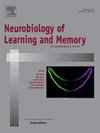学习后脑电图θ / β比值在长期导航表现中的作用
IF 1.8
4区 心理学
Q3 BEHAVIORAL SCIENCES
引用次数: 0
摘要
记忆巩固过程已被证明受益于大脑活动的调节,特别是θ波振荡。我们之前的研究表明,学习后Theta/Beta能量比的增加提高了在各种任务中的程序记忆和陈述性记忆的后续表现。在这项研究中,我们利用脑电图神经反馈(NFB)研究了在虚拟《我的世界》环境中导航任务中,额中线θ / β功率比的增加在增强空间记忆巩固中的作用。64名参与者被随机分配到三组中的一组:Theta/Beta NFB, Beta/Theta NFB或被动对照组。在空间记忆获取和虚拟环境中的三次记忆测试之后,参与者接受了旨在上调或下调Theta/Beta功率比的神经反馈干预。在干预后立即、24小时后和干预后一周评估表现。结果表明,虽然一些参与者没有通过使用非视觉效果来调节他们的Theta/Beta功率,但那些提高了Theta/Beta功率比的参与者,无论是否使用非视觉效果,都表现出了空间记忆的改善,这反映在更快的任务完成时间上。相反,Theta/Beta比值下降的参与者表现出表现下降,而被动控制组表现出微小的改善。虽然所有的参与者随着时间的推移都有所改善,但增加Theta/Beta比率的参与者表现出最显著的进步。这些发现强调了学习后Theta/Beta比值振荡在空间记忆巩固中的重要性。这项研究的意义延伸到临床神经调节应用和对记忆过程的更深层次的理解。本文章由计算机程序翻译,如有差异,请以英文原文为准。
The role of post-learning EEG theta/beta ratio in long-term navigation performance
Memory consolidation processes have been shown to benefit from modulations in brain activity, particularly theta oscillations. Our previous studies showed that increases in post-learning Theta/Beta power ratio improves subsequent performance in both procedural and declarative memory across various tasks. In this study, we investigated the role of increases in frontal-midline Theta/Beta power ratio using EEG neurofeedback (NFB) in enhancing spatial memory consolidation during a navigation task in a virtual Minecraft environment. Sixty-four participants were randomly assigned to one of three groups: Theta/Beta NFB, Beta/Theta NFB, or a passive control group. Following spatial memory acquisition and three memory tests in the virtual environment, participants underwent a neurofeedback intervention designed to either upregulating or downregulate the Theta/Beta power ratio. Performance was assessed immediately post-intervention, 24 h later, and one week after the intervention. Results indicate that while some participants failed to regulate their Theta/Beta power by using the NFB display, those who increased their Theta/Beta power ratio, regardless of NFB, showed improved spatial memory, reflected in faster task completion times. Conversely, participants who exhibited a decrease in Theta/Beta ratio showed performance declines, while the passive control group showed minimal improvement. Although all participants improved over time, participants who increased Theta/Beta ratio showed the most substantial gains. These findings highlight the importance of post-learning Theta/Beta ratio oscillations in spatial memory consolidation. The study’s implications extend to clinical neuromodulation applications and a deeper understanding of memory processes.
求助全文
通过发布文献求助,成功后即可免费获取论文全文。
去求助
来源期刊
CiteScore
5.10
自引率
7.40%
发文量
77
审稿时长
12.6 weeks
期刊介绍:
Neurobiology of Learning and Memory publishes articles examining the neurobiological mechanisms underlying learning and memory at all levels of analysis ranging from molecular biology to synaptic and neural plasticity and behavior. We are especially interested in manuscripts that examine the neural circuits and molecular mechanisms underlying learning, memory and plasticity in both experimental animals and human subjects.

 求助内容:
求助内容: 应助结果提醒方式:
应助结果提醒方式:


